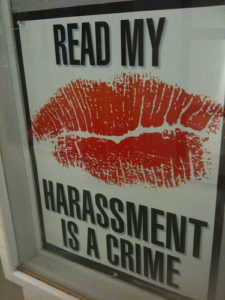 There’s big news out of the UK this week.
There’s big news out of the UK this week.
“”A police force has become the first in Britain to recognise misogyny as a hate crime, in an effort to make the county a safer place for women.
Nottinghamshire Police is recording incidents such as wolf whistling, street harassment, verbal abuse and taking photographs without consent within the hate crime definition.
It also includes unwanted sexual advances, uninvited physical or verbal contact and using mobile phone to send unwanted messages….
Sarah Green, acting director of the End Violence Against Women Coalition, said: ‘We welcome this because it comes off the local police force talking to and listening to local women’s groups. What we are talking about is not trivial behaviour – some harassment that women and girls receive in public is upsetting and should have the attention of the authorities.’
She added: ‘Police in Nottingham have not changed the law but they have listened to local women who said the behaviour bothered them. Together, they are recording it so they can monitor it and look back on who is doing it and where it happens.'”
While there are a lot of complications regarding criminalizing street harassment, and there are a lot of nuances for why it’d be hard, possibly unfair, and largely unenforceable to make all verbal street harassment illegal (especially in the USA), I still can’t help but cheer and tear up a little bit to see these horrible, demeaning and needless interactions classified as a HATE CRIME!! They should have no place in our society.
More about this story from Washington Post and Guardian.
“Misogyny hate crime is classed under the new policy as “incidents against women that are motivated by an attitude of a man towards a woman, and includes behaviour targeted towards a woman by men simply because they are a woman”…
Rachel Krys, co-director of the End Violence Against Women Coalition, said: ‘It is great that police in Nottingham will be capturing the way a lot of harassment in public spaces is targeted at women and girls. In a recent poll we found that 85% of women aged 18-24 have experienced unwanted sexual attention in public places and 45% have experienced unwanted sexual touching, which can amount to sexual assault.
‘This level of harassment is having an enormous impact on women’s freedom to move about in the public space as it makes women feel a lot less safe. The women we spoke to do a lot of work to feel safer, including avoiding parts of the city they live in, taking taxis and leaving events in groups.’
Krys said recording such incidents would give police and policymakers a much clearer grasp on the levels of harassment women and girls are subjected to, and better understand measures which could reduce it.
‘It should also challenge the idea that women and girls in public or online spaces are ‘fair game’,’ she added. ‘We know that ignoring harassment and sexist bullying creates the impression that other types of violence against women will be tolerated so we welcome any action which counters this.'”
